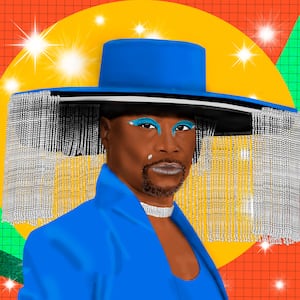After blissfully escaping Los Angeles to go on a long road trip with his family this summer, Jimmy Kimmel is officially back to the grind in a city that is full of smoke from the surrounding wildfires. “Everything tastes like a barbecue without the food,” he jokes.
When I ask the late-night host if he had trouble disconnecting from the news while he was away, he says, “I mean at first it was hard and then it was not hard. I feel like it’s either non-stop or stop. But it was nice to be able to get off the treadmill for a minute.”
This coming Sunday, Kimmel will get back on the treadmill to host an entirely virtual Emmy Awards. While he will deliver his monologue and other bits from an empty stage at the Staples Center, all of the presenters and nominees will appear from their homes.
Kimmel explains that he’s been honing the unique skill of telling jokes without any expectation of laughter starting with his early days as a radio DJ in Phoenix, Arizona. He perfected it during his monologues from home starting back in March when the coronavirus pandemic shut down production at Jimmy Kimmel Live! and every other late-night talk show.
After three months of “quarantine” shows, Kimmel revealed his plans to take the entire summer off, with a series of guest-hosts filling in for him until he ultimately returns to his theater the Monday after the Emmys. The announcement came amidst the George Floyd protests and a reckoning in the media that prompted Jimmy Fallon to apologize on his show for previously wearing blackface to portray Chris Rock on Saturday Night Live.
The next night, Kimmel delivered an emotional monologue about acknowledging his white privilege, but it wasn’t until after he went off the air for the summer that he decided to issue a public apology for his own unfortunate appearances in blackface to impersonate NBA player Karl Malone on The Man Show.
As the increasingly outspoken comedian tells me during our interview, he wanted to “tell the truth” about those “embarrassing” sketches from early in his career. But he also questions the “intentions” of the “Donald Trump Jr.’s of the world” who claim to be against “cancel culture” while at the same time doing everything they can to “cancel” comedians who make fun of them.
“We’ve now blurred the line between candidates and comedians,” he says. “They are very different and should be treated differently.”
Kimmel also explains why he is one of the few comics still willing to host award shows despite the inevitable backlash, how he maintains hope that Trump will be ousted from office in the fall, and a lot more.
So you’re currently preparing to host this entirely virtual Emmys, which is unlike anything we’ve seen before. What’s the plan, how’s it going to work?
I was hoping you were going to tell me. Isn’t that why we’re having this conversation?
Oh yeah, I forgot that was my job.
The plan is I’m going to be at the Staples Center essentially by myself. And people are going to be like 40 feet away from me, those who are there. There will be no audience. There will be no one to laugh, which is bad and also good because at least it won’t be a surprise if nobody laughs.
Yeah, I was wondering if you had to get used to telling jokes without getting laughs. Because that was the case when you were doing your show from home as well.
I just decided to try to think of it as a radio show with no co-host. And that seems to be what works for me.
Because you’ve hosted so many of these awards now, does the opportunity to do something really different appeal to you?
No, not at all. I will not lie to you. I would rather be doing this in front of an audience. You know, the fun part of it is getting laughs from people and this is like all of the work and none of the fun.
But you will get to kind of beam into all the nominees’ homes though, right? Is that how it’s going to work, where there are actually cameras in everybody’s homes for their acceptance speeches?
Yes, everyone will have the cameras positioned in such a way that it doesn’t seem like they’re very, very rich. I would imagine we’ll see people in their garages, people Zooming in from their kids’ rooms and that sort of thing.
What did you think about the recent trend of award shows going without hosts? Because that seems to be where we were headed until this and now it seems like it would be even harder to do a virtual award show without a host.
Honestly, it was kind of funny to me that they positioned it as if it was a conscious decision when the reality is they asked a whole bunch of people and they all said no. And then they made it seem like it was some kind of brilliant programming decision, which it turns out it wasn’t. The key is not to cut the host. The key is to make the show shorter. That’s how you do it if you want bigger ratings. But I like a host. I don’t like getting in a driverless car and I like to watch an award show with a host.
You’re just old-fashioned that way. But why do you think so many people were saying no to these award shows? You keep saying yes.
Because there’s almost no upside to it. It goes one of two ways. Either people go “OK,” or “Oh my God, that was terrible! Let’s put a stake through this guy’s heart.” Everything has become so unpleasant. It’s a tough thing for most people to navigate.
Do you think that the critics will be any more forgiving for you since you’re doing it in such a different way?
You know, I don’t worry about the critics. I think the critics write what they believe. Listen, we’re now split right down the middle. So I know going in, 50 percent of the people are gonna hate me. That wasn’t the case 10 years ago.

Stephen Colbert and Jimmy Kimmel speak onstage during the 71st Emmy Awards at Microsoft Theater on September 22, 2019, in Los Angeles, California.
Kevin Winter/GettySo the day after the Emmys, you’re going back to your theater in L.A. to do Jimmy Kimmel Live! with no audience. I remember you saying at the beginning of the pandemic that you were starting to worry that the networks are going to realize that they don’t need to pay for theaters and sets and everything else now that everybody can do this from home. Is that something that you’re still worried about at all?
I wouldn’t say I’m actually worried about it, but I do think that the future is smaller when it comes to television and television shows. And I think that that’s just going to be the way it is. Because a lot of it is show business and we don’t seem to be as interested in show business anymore now that we have TikTok and Instagram. I guess in a way, if you think about the ’40s and ’50s, even how people spoke in movies, it became more natural as the years went on. It’s kind of like that.
Yeah, it’s all becoming more similar to our everyday lives when there’s not as much of a line between show business and everybody else.
Yeah, when you see so many people behaving naturally, anything other than that feels more artificial I think.
We’re headed into these final weeks before the election. I’m wondering how you’re thinking about that in terms of how you’re going to approach what you talk about on the show. Do you feel like that’s going to change at all in this final stretch?
Well, there was a lot of Trump over the past three years and I don’t see why there would be any less over the next couple of months. I mean, it seems to be all anyone is talking about besides COVID in this election. And I know that there’s a lot of anxiety surrounding it. And when there’s a lot of anxiety, I think that’s when shows like mine have an opportunity to maybe, hopefully lessen that anxiety a little bit by pointing out the humor, pointing out the things that are funny about something that isn’t funny at all. So that’s a long way of saying, yeah, we’ll be talking about the election a lot.
We’re talking the day after Bob Woodward’s revelations about Trump deliberately downplaying the pandemic came out. The week before you have the comments about calling the military “losers” and “suckers.” After making jokes about him for so long, do you get a sense at this point that any of it will have an impact on the election or change people’s minds?
Oh, I hope so. I have this conversation a lot. And listen, I know a lot of Republicans, I know a lot of people who support Donald Trump. I don’t know why they do, but I do know people who fall into that category. And I also know that they’re not all a bunch of racist lame-brains. And I have been heartened to learn that there are a number of people in my life who voted for Trump the first time around who won’t do it again. And I think that even if 5 percent of his base feels that way—and boy, I hope we can get more than 5 percent of his base to feel that way—then that is a death knell for him.
It does feel like if anything is going to tip the election towards Joe Biden, it’s going to be the COVID crisis. And especially now knowing how much Trump misled the American public about it—which is something we basically knew already, but this is just confirming it—and him basically admitting it.
Isn’t it crazy that it took this to give Biden the edge? I mean, really, it seems like we should have figured this out the first day when he announced his crowd size was three times bigger than it actually was, when he challenged the veracity of photographs. But that’s how divided we are, I guess.
I’m curious if you ever find yourself hesitant to make jokes about Joe Biden given the stakes of the election.
No, I do still feel a sense of fairness and if a joke feels true and if I think it’s going to work, I’m going to tell it. Because I am not part of the campaign team, as much as some would like to believe. I think that we have to hold our politicians accountable and find humor in what they do, no matter which side they’re on.
Do you have any plans to have either Joe Biden or Kamala Harris on your show and what do you feel like they aren’t being asked that you would want to ask them?
Yes. I mean, we don’t have a date set for any of them, but I think that they know that if it works out for their schedules that we’d love to have them on the show. As far as what I’d like to ask them, I don’t know, I haven’t really given that a lot of thought. But I am interested in the idea of, how do you approach running against a maniac, running against someone who has no rules? Are you at a disadvantage if you have a sense of decency and behave that way? I always feel like if I was debating Donald Trump, it would devolve into a roast immediately. I’d begin insulting him from the first minute until the end of the debate. And it seems to me that it would take a lot of self-control not to.
And hard to know if that would be the most effective approach or not.
I’m sure it probably wouldn’t, especially for them, but, you know, I’m not particularly mature.
So you were off during the conventions, but one thing that really stood out from the Republican convention was how much “cancel culture” was the huge theme that they decided to focus on. Since then we’ve seen Trump try to cancel Fox News reporters or companies that he doesn’t like. And then there’s also the irony of conservatives, like Sean Hannity and others trying to “cancel” you repeatedly over the years. How do you think about all of that, both from a personal and a political perspective?
Well, I think it’s unfortunate that that has become something they can grab onto, because I know that’s not something that is particular to the right side of the aisle. I think a lot of people feel like this cancel culture goes too far and that there’s just no room for apology anymore, that everybody is constantly digging through your trash. And that it’s not particularly beneficial as far as a functioning society goes. But I do think it’s unfortunate, because [Trump] is able to grab onto that and to use it as a tool. But most of that has nothing to do with politics. We’ve now blurred the line between candidates and comedians and they are very different and should be treated differently. And it does bother me that there are comedians who go into a club that might be fearful about saying something that runs afoul of the political-correctness police. Because you have to be able to say the wrong things to figure out what the right things are and to speak the truth. That kind of self-censorship is dangerous. And I don’t think we even know that it’s happening when it happens. I mean, who wants to go into a comedy club where everyone’s being careful? That’s not the America I want to live in.

At the same time, obviously at the beginning of your hiatus, you did release a long statement apologizing for these past blackface sketches that you had done a long time ago and explaining your reluctance to address it because of some of these issues. So what went into that decision to issue that long apology?
Well, you used the word “blackface,” I did not. What went into that decision is just more than anything, just telling the truth, that it is embarrassing to me. And also, I questioned the intentions of most of those who were complaining about it. I know where it was coming from. It was coming from the Donald Trump Jr.’s of the world, people who do a tremendous amount of damage to this country in order to elevate themselves and to make themselves famous and to make money. And it just seemed like things were taken out of context and I wanted to put them back into context and move past it.
Another thing that happened during all of the protests and mostly after you went off the air, was that late-night TV got very serious. And I know you’ve been known to get emotional on your show as well, over some really serious things. Do you ever worry that the humor on these shows is getting lost in any way?
No. I think, you know, we’re on every night and most nights are jokes. So no, I don’t think the humor is getting lost. I’m not interested in seeing a guy read a bunch of monologue jokes in a row. I want to know what the person thinks and I want something more. I think it goes back to what we talked about before about show business becoming less showy. I like it when I see [Stephen] Colbert or Seth [Meyers] or any of these guys really talk about something serious. I feel like there are things I learn from it.
For more, listen and subscribe to The Last Laugh podcast.




